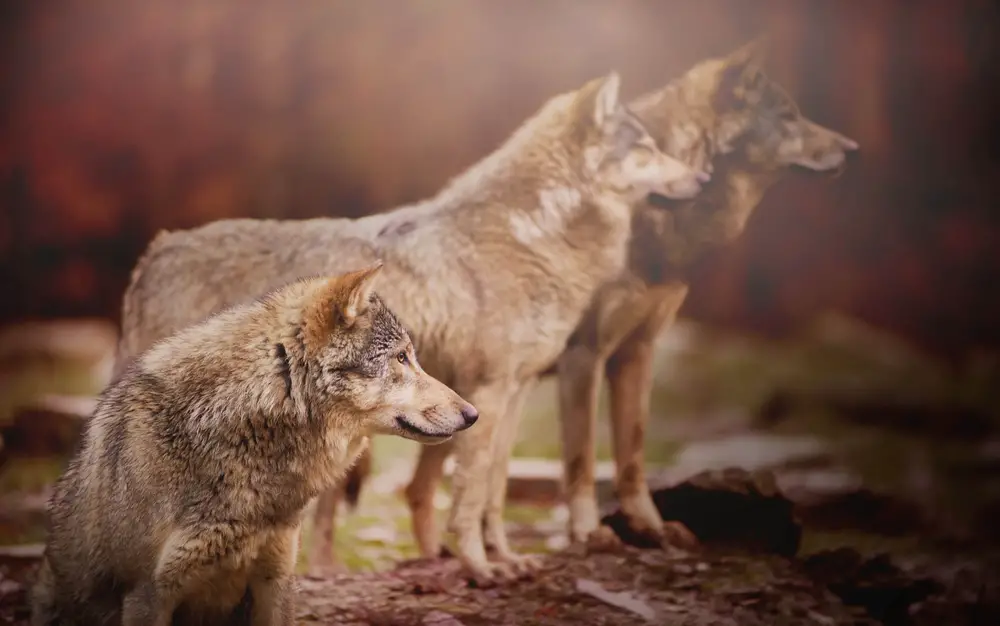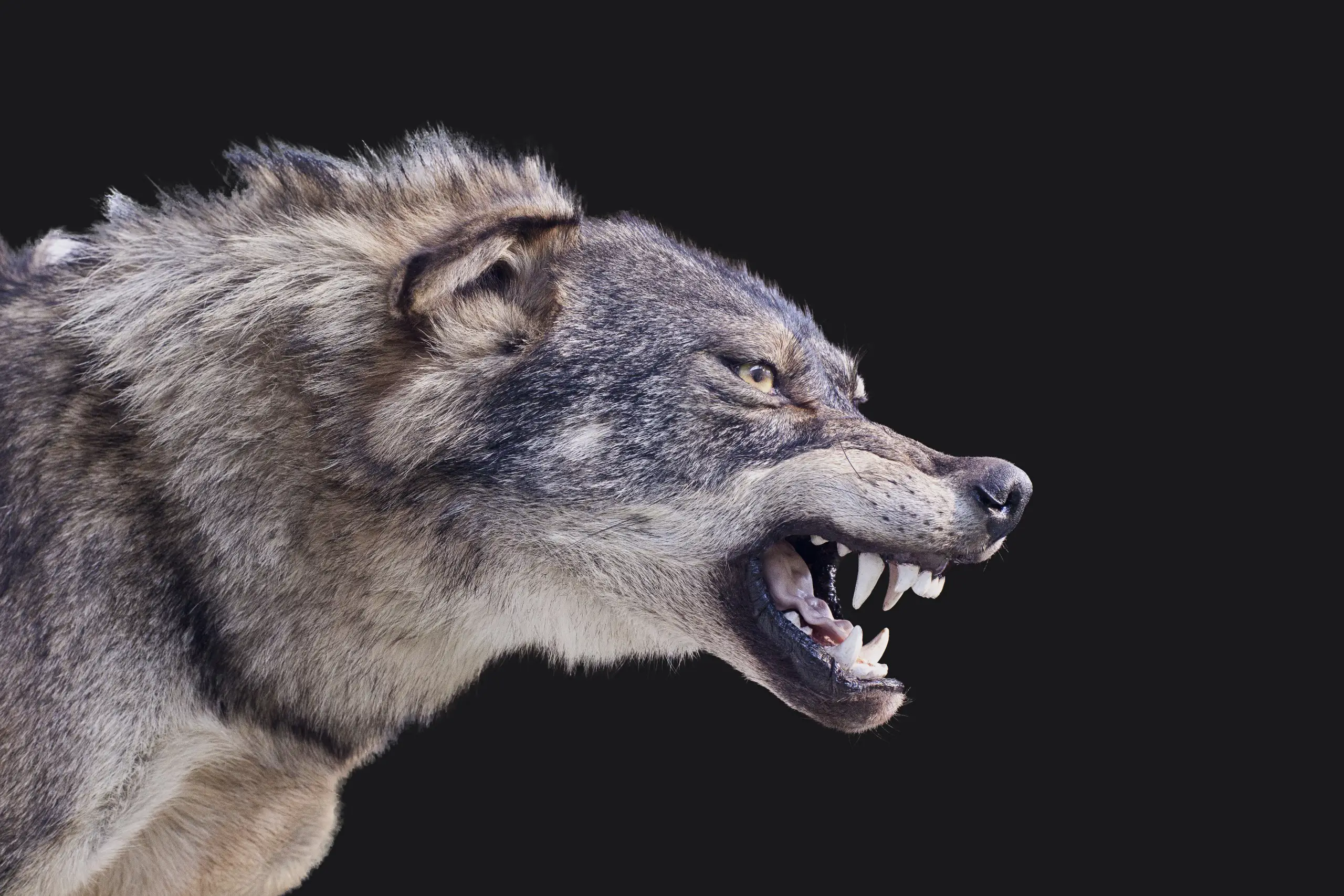Wolves are wild animals, and many people wouldn’t consider trying to tame a wild animal, especially one that is considered a top predator in the ecosystem. For example, you wouldn’t consider domesticating a lion, would you?
However, due to the fact that wolves are distant relatives of dogs, some people wonder whether it would be possible to domesticate a wolf. After all, dogs used to be wild animals thousands of years ago, so why can’t wolves be the same way?
Unfortunately, wolves cannot be domesticated and therefore you cannot tame them. Let’s look into why this is in today’s article.
What is domestication?
The definition of domestication reads as: ‘the process of taming an animal and keeping it as a pet or on a farm.’ Some animals that have been successfully domesticated are cats, dogs, rabbits, goats, sheep, domestic pigs, and many more.
These animals have been tamed over many years to coexist happily with humans. This process allows us to invite the animals into our houses or onto our land and keep them there without the worry of them harming us.
We don’t know about you, but we couldn’t imagine keeping a wolf in our house without worrying slightly!
Domesticating an animal takes generations to perfect, with each generation becoming slightly more tame and content with living alongside humans. This process can take thousands of years, as many animals are not easy to domesticate.

The relationship between wolves and humans
Over thousands of years, wolves have steered clear from humans as much as possible. Despite being portrayed as scary, human-eating monsters in films and books, wolves rarely actually attack humans. Instead, they keep to themselves in their packs.
However, this doesn’t mean that wolves are easy to tame. Wolves are still a top predator that will regularly attack live animals such as pets and livestock.
Why haven’t wolves been domesticated?
There are a number of reasons why dogs were domesticated and wolves were left as wild animals. For starters, wolves are very particular animals that require lots of specialized care.
They can get this from the wild – wolves are very independent and know how to take care of themselves.
If we were to take them from their natural habitat, wolves might be subjected to neglect and unjust stress due to the difference in their home. Below are a few reasons why wolves have not been tamed as their ancestors have.
Wolves need lots of space
In the wild, wolves have ample space to roam. In fact, they often inhabit territories of up to 100 square miles to ensure that they always have enough space to gather enough food, water, and shelter.
If you were to take a wolf out of this territory and place it in a much smaller area, they might start to experience severe anxiety and depression. You might also start to see negative impacts such as over-grooming, self-mutilation, or excessive pacing.
Wolves are not domesticated animals
As we have already mentioned, domestication takes thousands of years – and this has never been successfully done on wolves.
While dogs are loving and affectionate beings, wolves are often very different from dogs in terms of personality. So, inviting a wolf into your home is much different than inviting a dog inside.
Wolves require a specific diet
Domesticated animals have adapted digestive systems that can tolerate food such as kibble. However, wolves do not have this luxury. Instead, these carnivores require raw meat in their diets to thrive. They also need to eat organs, bones, fur, feathers, antlers, and more.
No, we’re not kidding! If you were to keep a wolf tamed on your land, you’d need to keep up with its meat demands. Not only is raw meat and bones difficult to get your hands on, but wolves also need a lot of it to remain happy! They’ll need around 20 pounds of meat every week.
Wolves travel in packs, so you need to mimic this structure if you were to tame one. A pack of wolves is a family unit, with two parents and all of their offspring.
Taking a wolf away from this unit can put the entire pack in danger as they all work together to keep each other safe and survive.
So, you need to ensure that your wolves are kept in social groups. However, it’s not as simple as plucking a few wolves from the wild and keeping them together – wolves of different packs might fight to the death. Instead, you should keep them in their family units.
Wolves can be dangerous
As we keep repeating, wolves are top predators and therefore can be very dangerous when they feel threatened. While wolves won’t often attack humans, they will if they feel the need to protect themselves.
This risk can be increased if the wolf is feeling stressed or depressed due to being taken out of its natural habitat, away from its family, or hungry from a lack of food.
Wolves are known for escaping containment
Wolves are great jumpers, climbers, and diggers. This makes it extremely difficult to keep them in containment. Not to mention that these animals are extremely smart, and they can actually observe humans figure out how to open most gates.
Finding a containment option that wolves won’t be able to escape from can be difficult, not to mention dangerous.
Many veterinarians won’t treat wolves
Finally, exotic ownership laws are not the same in different areas of the United States. Wolves are not commonly on the list of animals that humans can keep with a correct license, and therefore you’ll find it difficult to find professional help if your wolf is taken ill. Many veterinarians will turn you away.
Summary
Overall, wolves cannot be tamed and you’d be hard-pressed to find a professional who would think this to be a good idea.
There are many reasons why wolves should not be tamed, such as the fact that their demands are very difficult to meet. You’ll need to get their socialization, habitat, food, and much more correct to prevent them from getting stressed out and ending up in a dangerous situation.


